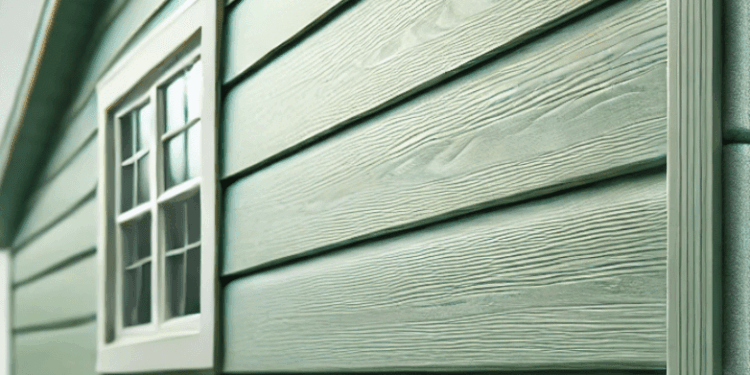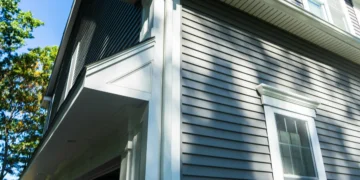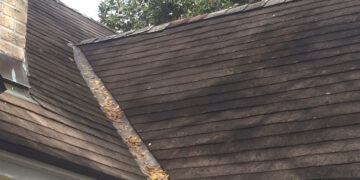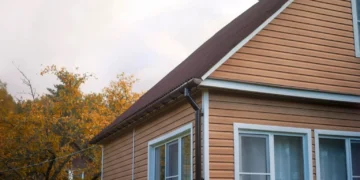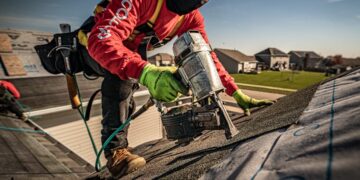As insulated vinyl siding near me takes center stage, this opening passage beckons readers into a world crafted with good knowledge, ensuring a reading experience that is both absorbing and distinctly original.
When it comes to finding the right insulated vinyl siding near your location, there are key factors to consider. From understanding the benefits to choosing the right contractor, this guide will shed light on all you need to know.
Importance of Insulated Vinyl Siding
Insulated vinyl siding plays a crucial role in enhancing the energy efficiency of homes while also reducing heating and cooling costs. This type of siding offers a range of benefits that make it a popular choice among homeowners looking to improve their property's insulation.
Improved Energy Efficiency
- Insulated vinyl siding acts as a barrier against heat transfer, keeping the interior of the home at a more stable temperature throughout the year.
- By reducing the amount of heat that escapes during the winter and enters during the summer, insulated vinyl siding helps to lower the workload on heating and cooling systems.
- This increased energy efficiency can lead to a more comfortable living environment and lower utility bills.
Reduced Heating and Cooling Costs
- With its insulating properties, insulated vinyl siding can significantly decrease the amount of energy needed to heat or cool a home, resulting in cost savings for homeowners.
- By preventing air leaks and drafts, this type of siding helps to maintain a consistent indoor temperature, reducing the need for constant adjustments to the thermostat.
- Over time, the savings on heating and cooling costs can offset the initial investment in insulated vinyl siding, making it a cost-effective choice for homeowners in the long run.
Finding Insulated Vinyl Siding Contractors
When looking for insulated vinyl siding contractors in your area, it is important to consider several key factors to ensure you choose the right one for your project. From reviews to pricing and services offered, evaluating contractors thoroughly can help you make an informed decision.
Here are some tips on finding the best insulated vinyl siding contractors near you:
Identify Key Factors
- Check online reviews and ratings to gauge the reputation of the contractors. Look for feedback from previous customers to get an idea of the quality of their work.
- Compare pricing quotes from different contractors to ensure you are getting a fair price for the services offered. Be wary of any significantly low or high quotes compared to the average market rates.
- Consider the services offered by each contractor. Some may provide additional services such as insulation upgrades or trim work that can enhance the overall look and functionality of your siding.
Evaluate Reputation and Reliability
- Ask for references from past clients and follow up to get firsthand accounts of their experience working with the contractor.
- Check if the contractor is licensed, insured, and bonded to protect yourself in case of any accidents or damages during the project.
- Look for any professional affiliations or certifications that demonstrate the contractor's commitment to quality and industry standards.
Types of Insulated Vinyl Siding
Insulated vinyl siding comes in various types, each offering unique benefits and features. Let's explore the different options available in the market and understand the differences between traditional vinyl siding and insulated vinyl siding.
Foam-Backed Insulated Vinyl Siding
Foam-backed insulated vinyl siding is a popular choice due to its energy-efficient properties. The foam insulation provides an extra layer of protection against heat loss, making it ideal for homeowners looking to improve their home's energy efficiency. This type of siding also helps to reduce outside noise and increase the overall durability of the siding.
Rigid Foam Insulated Vinyl Siding
Rigid foam insulated vinyl siding is another option that offers enhanced insulation properties. This type of siding typically has a higher R-value compared to foam-backed insulated siding, providing even better energy efficiency. Rigid foam insulated siding is known for its strength and impact resistance, making it a durable choice for homeowners
.
Backer Board Insulated Vinyl Siding
Backer board insulated vinyl siding combines the benefits of traditional vinyl siding with an added layer of insulation. The backer board provides extra durability and strength to the siding while also improving its energy efficiency. This type of insulated vinyl siding is a great option for homeowners looking for a balanced combination of insulation and durability.Overall, insulated vinyl siding offers improved energy efficiency, durability, and aesthetic appeal compared to traditional vinyl siding.
By choosing the right type of insulated vinyl siding for your home, you can enjoy long-lasting protection and energy savings for years to come.
Installation Process of Insulated Vinyl Siding
Insulated vinyl siding is a popular choice for homeowners due to its energy-efficient properties and durability. The installation process requires precision and expertise to ensure a seamless finish that provides optimal insulation for the home.
Steps Involved in Installing Insulated Vinyl Siding
- Preparation of the Exterior: This involves removing any existing siding, repairing any damaged areas, and ensuring a smooth surface for the new siding installation.
- Measurement and Cutting: Accurate measurements are taken to cut the insulated vinyl siding panels to fit the dimensions of the home.
- Installation of Insulation: Insulation boards are installed beneath the siding to enhance energy efficiency and provide additional protection.
- Securing the Siding: The insulated vinyl siding panels are then securely attached to the exterior of the home using nails or screws.
- Finishing Touches: J-channels, corner posts, and trim pieces are added to complete the installation and give the siding a polished look.
Role of Professionals in the Installation Process
Professional contractors play a crucial role in the installation of insulated vinyl siding. Their expertise ensures that the siding is installed correctly, maximizing its energy-saving benefits and longevity. They have the necessary tools and experience to handle any challenges that may arise during the installation process.
Common Challenges Faced During Installation and How to Address Them
- Uneven Surfaces: If the exterior surface of the home is uneven, it can make the installation process more challenging. Professionals can address this by using additional insulation or leveling techniques to create a smooth foundation for the siding.
- Weather Conditions: Extreme weather conditions can impact the installation process. Contractors may need to reschedule the installation if weather conditions are unfavorable to ensure a proper and secure installation.
- Proper Sealing: Ensuring that the insulated vinyl siding is properly sealed is essential to prevent moisture infiltration and maintain energy efficiency. Professionals use specialized techniques and materials to seal the siding effectively.
Final Thoughts
In conclusion, insulated vinyl siding near me offers a range of benefits for homeowners looking to enhance energy efficiency and reduce costs. By exploring the types, finding reputable contractors, and understanding the installation process, you can make informed decisions for your home improvement projects.
FAQ Corner
What are the benefits of insulated vinyl siding?
Insulated vinyl siding helps improve energy efficiency, reduces heating and cooling costs, and enhances the overall comfort of your home.
How do I find the right insulated vinyl siding contractor near me?
Consider factors like reviews, pricing, and services offered. Evaluate their reputation and reliability before making a decision.
What are the different types of insulated vinyl siding available in the market?
There are various types such as traditional vinyl siding and insulated vinyl siding. Each type differs in terms of durability and maintenance requirements.
What is the installation process of insulated vinyl siding?
Installation involves specific steps carried out by professionals. Common challenges include proper alignment and addressing any underlying issues on the exterior walls.

